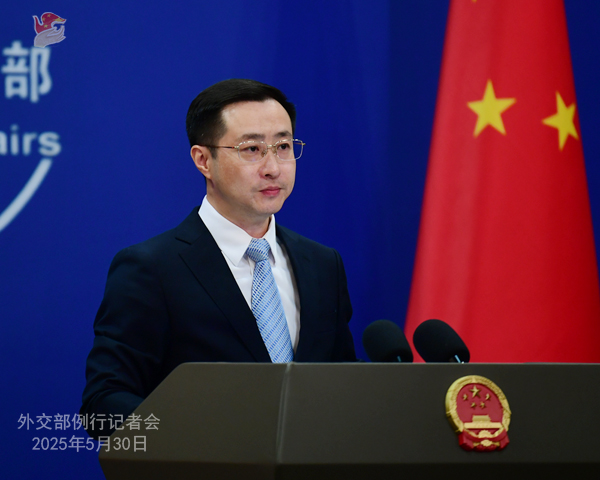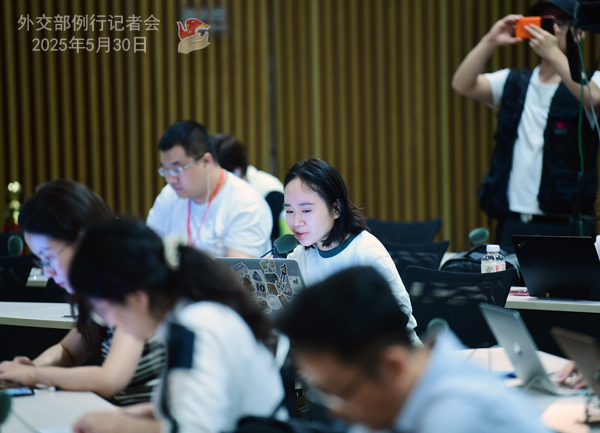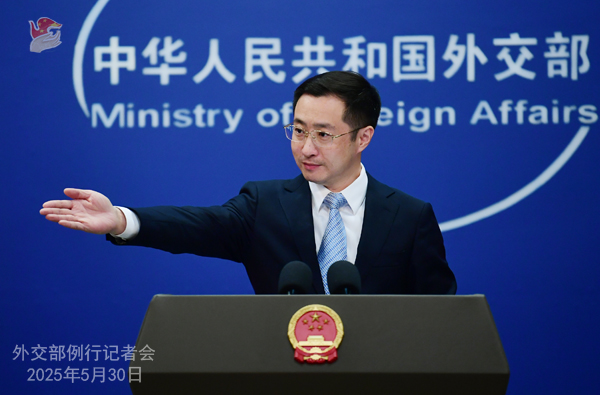
People’s Republic of China


CCTV: Foreign Minister Wang Yi attended the signing ceremony of the Convention on the Establishment of the International Organization for Mediation in Hong Kong this morning. Can you share more information about that?
Lin Jian: The signing ceremony of the Convention on the Establishment of the International Organization for Mediation was held in Hong Kong this morning. Member of the Political Bureau of the CPC Central Committee and Foreign Minister Wang Yi attended and addressed the ceremony. Representatives from 33 countries signed the convention and these countries became founding members of the organization. High-level representatives from over 50 countries and close to 20 international organizations attended and witnessed the ceremony.
The International Organization for Mediation is an innovation in international rule of law and has great significance in the history of international relations. It fills the gap for mechanisms in the field of international mediation, and serves as an important public good for the rule of law that contributes to improving global governance. The establishment of the organization practices the purposes and principles of the UN Charter, embodies the wisdom of harmonious coexistence among civilizations, and demonstrates the inclusive spirit of the rule of law.
Foreign Minister Wang Yi noted in his remarks that, it is China’s consistent position that differences should be handled in the spirit of mutual understanding and mutual accommodation, consensus should be built up through ways of dialogue and consultation, development should be promoted in the attitude of win-win cooperation, and problems should be addressed from a future-oriented perspective, and we can actively explore solutions with Chinese characteristics to hotspot issues. It is hoped that parties will uphold the purposes of the UN Charter, carry forward the spirit of reconciliation, cooperation and harmony, defend fairness, justice and equity, and advocate extensive consultation, joint contribution and shared benefit.
As agreed through consultation among the negotiating states of the convention, Hong Kong will host the headquarters of the organization. Hong Kong, with its highly advanced rule of law and having the strengths of both the common law system and civil law system, enjoys unique advantages in international mediation. China hopes that the signatory states will ratify the convention at an early date. We welcome more countries to join us and promote the organization to play a positive role in the peaceful resolution of international disputes.
Hubei Media Group: We’ve learned that on May 28, China’s General Administration of Customs held a technical exchange with the Japanese side on the safety of Japanese aquatic products. Can you further brief us on that?
Lin Jian: Since the beginning of this year, based on the continuous implementation of international monitoring of the ocean discharge of Fukushima nuclear-contaminated water and the fact that there’s no abnormality in the result of China’s independent sampling and testing, China and Japan have had engagement and consultation on the safety of Japanese aquatic products. On May 28, China’s General Administration of Customs held a new round of technical exchange with the Japanese side in Beijing at the latter’s request on the safety of Japanese aquatic products and achieved substantial progress. Japan promised to take credible and visible measures to guarantee the quality and safety of its aquatic products and ensure that they meet China’s regulatory requirements and food safety standards.
China Review News: It's reported that Fitch, S&P, and Moody’s have all affirmed Hong Kong’s stable rating outlooks. Moody’s upgraded the outlook and pointed out that Hong Kong’s credit ratings remain reliable and it still stands out in addressing challenges at a time of trade tensions. What’s your comment?
Lin Jian: I also noted this. Amid the current rising uncertainties facing the world economy, the positive evaluations of Hong Kong’s credit profile demonstrate the region’s economic resilience and positive outlook, which is another vote of confidence in Hong Kong’s status as an international financial center. The government of the Hong Kong Special Administrative Region also said that Hong Kong’s robust financial system, active capital market and thriving IPO market say a lot about global investors’ confidence in Hong Kong. What’s more, the steady progress of China’s high-quality development offers the region greater development opportunities and driving forces. We’re fully confident in Hong Kong’s development. Foreign companies are welcome to invest in Hong Kong with optimism for development and prosperity.
Bloomberg: U.S. politician John Moolenaar had an interview yesterday. He’s the chairman of the House Select Committee on the Chinese Communist Party. He said that the U.S.’s recent measures were with the aim of pushing back against the “aggression of the Chinese Communist Party.” Finally, he also called for a reset in the relationship between the U.S. and China. Does the Foreign Ministry have any comment on Mr. Moolenaar’s recent comments?
Lin Jian: The U.S. politician’s remarks reek of ideological bias and Cold War zero-sum mentality. Any attempts to smear and attack the Communist Party of China, vilify China’s path and system, and stoke division and hostility between the CPC and the Chinese people are delusional and presumptuous, which will only meet the firm opposition of over 1.4 billion Chinese people and are doomed to failure.

AFP: In an interview, the U.S. Treasury Secretary Scott Bessent said that trade negotiations with China were “a bit stalled” and he suggested that they may require the involvement of the leaders of the two countries. Does the Chinese side view the talks as stalled? Can the Foreign Ministry give an update on the status of trade talks? Is China still confident in reaching a trade deal with the U.S.?
Lin Jian: China made clear its position on the tariff issue more than once. For anything specific, I’d refer you to competent authorities.
Reuters: It’s reported that the U.S. is planning to increase weapon sales to Taiwan to levels above where they were during President Donald Trump’s first term. How would such a move affect U.S.-China relations? What measures might China take in response?
Lin Jian: The Taiwan question is at the core of China’s core interests, and the first red line that cannot be crossed in China-U.S. relations. China firmly opposes the U.S.’s arms sales to China’s Taiwan region, and urges the U.S. to abide by the one-China principle and the three China-U.S. joint communiqués, especially the August 17 Communiqué of 1982, stop selling arms to Taiwan and stop creating new factors that could lead to tensions in the Taiwan Strait. China is firmly resolved to defend its national sovereignty and territorial integrity.
NHK: I’d follow up on the resumption of Japanese aquatic product imports. Could you go into detail regarding the substantial progress that you mentioned? Japan said a consensus was reached between the two sides on the technical conditions of resuming Japanese aquatic product imports. Does China share the same view? How does China look at the prospects of the resumption?
Lin Jian: On the first question, as I just mentioned, Japan promised to take credible and visible measures to guarantee the quality and safety of its aquatic products and ensure that they meet China’s regulatory requirements and food safety standards.
On your second question, the Chinese government always puts people first, and firmly ensures people’s food safety. In accordance with relevant domestic laws and international trade rules, competent authorities will study Japan’s request for resuming the Japanese aquatic product imports under the principles of science and safety.
Reuters: A Chinese embassy spokesperson in Washington has told Reuters in response to a New York Times report on the U.S. suspending engine sales to China’s aerospace manufacturer COMAC that China firmly opposes the U.S. overstretching the concept of national security and abusing export controls. Is that not what China is doing with its own export controls on rare earth? What is the difference between the U.S. and the Chinese export controls?
Lin Jian: China’s export control measures are consistent with universal practices. Such measures are non-discriminatory and not targeted at any particular country. We stand ready to strengthen dialogue and cooperation on export control with relevant countries and regions and are committed to keeping global industrial and supply chains stable. What the U.S. does overstretches the concept of national security, politicizes and weaponizes trade and tech issues and are malicious attempts to block and suppress China. We firmly oppose that and will resolutely defend our legitimate rights and interests.
*************************
For the Dragon Boat Festival holiday, there will be no regular press conference on Monday, June 2. The press conference will resume on Tuesday, June 3. During the holiday, questions can be submitted to the Spokesperson’s Office via fax, email or WeChat.




